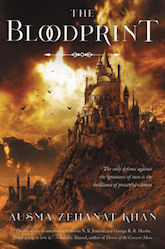I was under the impression, for some reason, that The Bloodprint was Ausma Zehanat Khan’s first novel, but it turns out that she’s already written a mystery. The Bloodprint, then, is Khan’s first fantasy novel, and she has delivered the opening volume of an epic very much in the doorstopper tradition.
Arian is a Companion of Hira. She is sent on a quest to find a relic known as the Bloodprint, a book of the Claim—a text which is sacred, and remembered largely in fragments—with a small group of companions. She does not trust the motivations of the woman, the First Companion, who sent her, and she is pursued by the forces of the oppressive, conquering, misogynistic Talisman, the followers of a repressive preacher who burn libraries, destroy the written word, enslave women found without men, and otherwise act like utter arseholes. On her way north to the Wall and beyond it, to the city of Marakand, she must overcome peril, figure out a way through new lands, and be admired by an array of men in varieties both sleazy and heroic. But her allies are maybe not as trustworthy as she might have hoped.
I wanted to like it more than I did. In terms of voice, characterisation, and prose style, it feels not quite cooked yet: it only begins to feel like it gels together into something greater than the sum of its disparate parts in the last 100 pages (quite late for 400-page-plus book), just in time for it to cliffhanger on the way to volume two. I’m an old and jaded critic, and I have come to prefer books that feel narratively satisfying within a single volume, even if they are clearly part one, than books that feel as though they stopped more because they ran out of room than they reached a natural break point. I am also not given to enjoying the repeated single-sentence paragraph.
Once is fine for emphasis.
Multiple times in quick succession becomes tiring.
 What did I like about The Bloodprint? The thing that looms largest for me is the way in which the written word and the remembered, repeated text of the Claim, has a power that is both magical and religious at once. The rhythm of the text, the shape and form of the paragraphs/stanzas/lines we see in the book, recollect the Quran, much as the landscape and the imagery recollects Central Asia, in a way that mirrors how Robert Jordan’s Wheel of Time, for example, recollected Christianity and some of the mythic tropes of western Europe.
What did I like about The Bloodprint? The thing that looms largest for me is the way in which the written word and the remembered, repeated text of the Claim, has a power that is both magical and religious at once. The rhythm of the text, the shape and form of the paragraphs/stanzas/lines we see in the book, recollect the Quran, much as the landscape and the imagery recollects Central Asia, in a way that mirrors how Robert Jordan’s Wheel of Time, for example, recollected Christianity and some of the mythic tropes of western Europe.
Some of those Central Asia inspirations proved jarring, when set against some of the other choices that Khan has made. A land called Khorasan, cities called Hira and Marakand, regions called Hazar and Candour, exist alongside people with titles like “Immolan” and “Authoritan,” “Commandhan” and “Authenticate,” regions called “Far Range” and mountains called “Death Run,” a horn called “Avalaunche,” lending a bit of a Mad-Max-meets-Ibn-Battuta flavour to proceedings.
There are ways in which this feels like a naive epic fantasy—using the word “naive” in the artistic sense, as in deliberately rejecting some of the more developed techniques and norms in the field. It is naive in its characterisation, using very broad strokes to delineate its characters. Its manipulative probably-villains, the First Companion, the Black Khan, the Authoritan of Marakand and his Augur-Consort, have little interiority: we only see them trying to manipulate Arian, and the reader lacks enough context to know if any of their decisions makes sense. Our heroes are similarly broadly drawn: the brave heroine Arian, her loyal companion Sinnia, the man she left behind who still loves her despite her choosing duty over him (the Silver Mage)… and so on. Many of the secondary characters appear more complex and interesting in the brief glimpses we have of them. This is an issue complicated by Khan’s kitchen-sink approach to incident and emotion, and by an unevenly-paced first three-quarters of the novel.
And by an emotional tone of angst that the novel’s first half doesn’t do enough to earn. In some ways, The Bloodprint feels to me a lot like the epic fantasies of the late eighties and early nineties that I first came across in my early teens, when everything was shiny and new. If I were not so surfeited on multi-volume epic fantasies at this point in my life, I might like it better. But stylistically and structurally, it does more things that annoy me than it does things that satisfy me.
And, mark you, I am almost never going to be fully on board with a novel in which the main character is pale-ish and beautiful, and all the men in the book want to seduce her or possess her—and we are told she is beautiful because men keep telling her she is beautiful—while her sidekick, a black woman, is constantly overlooked or derogated by those men.
I wanted to like The Bloodprint. I want to read more epic fantasies that draw on the rich history of Central Asia. But while The Bloodprint shows some promise, it doesn’t really work for me.
The Bloodprint is available from Harper Voyager.
Liz Bourke is a cranky queer person who reads books. She holds a Ph.D in Classics from Trinity College, Dublin. Her first book, Sleeping With Monsters, a collection of reviews and criticism, is out now from Aqueduct Press. Find her at her blog, where she’s been known to talk about even more books thanks to her Patreon supporters. Or find her at her Twitter. She supports the work of the Irish Refugee Council and the Abortion Rights Campaign.










